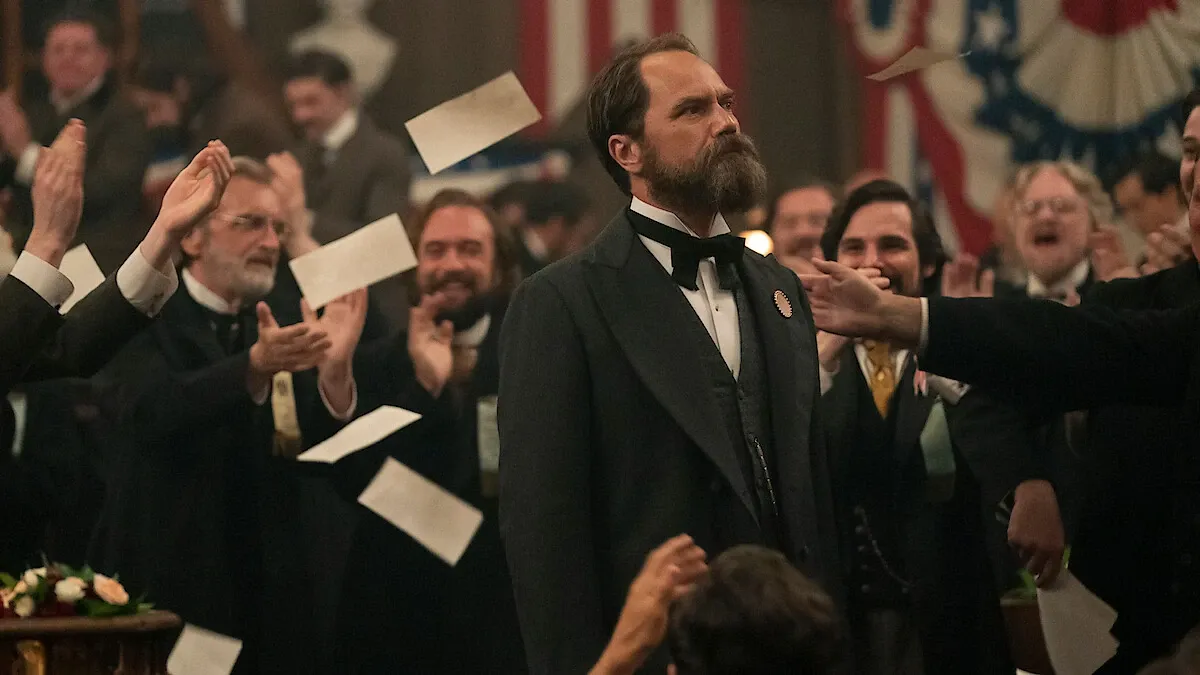★★ | Generational gap
This is not death, but a rebirth, one could say. After a mostly aimless second season and months of behind the scenes drama, AMERICAN GODS reboots itself into a new show entirely.
Superficially, everything remains the same. Shadow Moon (Ricky Whittle) wanders lost in the labyrinthine war between old and new gods, while Mr. Wednesday (Ian McShane) plays his tricks across the country. But under the surface is where everything changes, and none of it pretty. With most of the original cast now gone, AMERICAN GODS settles into mediocrity and embraces hugely problematic elements of systemic racism – precisely the kind it used to fight.
Before the end of the re-pilot, the new direction for AMERICAN GODS is clear. Every minority character, be that Anansi (Orlando Jones), Salim (Omid Abtahi), Jinn (Mousa Kraish), or Mr. Ibis (Demore Barnes) are either gone or sidelined. Yetide Badaki sticks around for a bit longer, but it’s clear the new showrunner Chic Eglee has no interest in this part of the conversation any longer. One particularly heartbreaking and egregious moment comes early on, after Salim discovers the Jinn has left in a Simpsons-esque disappearing act. He seeks out Wednesday for an explanation and is told in no uncertain terms to fuck right off. Salim disappears out the door, never to reappear.
Within an hour, the once diverse show rids itself of any semblance of the past. Instead, it casts, of all people, Marilyn Manson in a prominent role for the future.
Under Eglee, the once-powerful series now feels like a milquetoast celebration of upholding every single institution around. While technically never terrible, it’s not remarkable either. Instead, everything is precisely what a studio would expect from a show desperate for middle-of-the-road approval.
Where the first season achieved critical acclaim thanks to its irreverent and unbound tone, it put off mainstream viewers for exactly the same reason. The new AMERICAN GODS does not rock the boat because that would imply there’s enough vision left to make waves.
Every problem with the rebooted AMERICAN GODS stems from Orlando Jones’s firing. Jones, who put the series on the map alongside Whittle and McShane, was quietly canned between seasons for, according to him, having a voice. In response, the producers claimed that Jones’s omission is because his character doesn’t appear in this part of the book. As far as excuses go, this is particularly obscene, as season three dedicates a considerable portion of its time to expanding the storyline of Laura Moon and introducing Cordelia, a new character invented for the show, who travels alongside Wednesday.
Neither of them is particularly bad, but they have nothing to contribute, either. Instead, Laura gets to spend an entire episode shown what a bad person she is, which isn’t anything we haven’t heard before.
This backstory could lead to something in better hands, but neither Eglee nor his writing staff seems to care about what to do with Laura. “All of this isn’t just redundant, but fucking redundant,” she exclaims in a rare moment of self-awareness. It doesn’t help that she’s still a lovesick mess, seeking approval from a man beyond her reach. It’s just not Shadow this time.
Similarly, Shadow spends most of the early season asking questions and reacting to things, regressing back to where he was at the beginning. At an extended ten episodes, season three feels more than ever like it’s spinning plates, uncertain where it actually is going.
But all of these are symptoms of a far more significant ailment. Season three of AMERICAN GODS lets down its audience, mission statement, and remaining integrity by embracing systemic racism wholeheartedly to appear apolitical.
For a series claiming it has no place for Orlando Jones, season three still impotently attempts to pay lip service to its past by featuring one of the most wildly insulting scenes in recent memory.
Replacing Anansi are two gods of compassion who preach unity, peace, and comfort. In a baffling and tone-deaf scene, slaves from cotton fields break their chains and fall into the embrace of deities in golden fields, who promise they shall overcome their trials one fine day. Just not through anger. A prominent black character undergoes cruel torture, only to survive through solace not in anger, but joy over her life power and grace.
Elsewhere, Bilquis, goddess of creation and sex, comes framed through a male gaze. Gone is the poetic beauty of season one, replaced instead with an emphasis on cheap titillation. Later, she is sidelined and replaced with the white man’s go-to answer for troubled productions: a procedural.
If the previous paragraphs don’t make you angry, you’ll probably enjoy AMERICAN GODS. For the rest of us, it’s a testament to how far the show has fallen.
Beneath all the problems is Neil Gaiman’s original prose, which remains evocative and quintessential. The discovery of American history and cultural legacy bathed in blood is a vital exploration that continues to be worthwhile. McShane and Whittle, leading the series, remain as compelling as ever. They aren’t, nor have they ever been, the problem.
But the decisions made to bring AMERICAN GODS to its current place indicate someone involved is not interested in the same story it set out to tell. Instead, the series falls victim to rewriting history, too scared to confront its nature as a highly political show. Because of this, it is torn apart by two forces. One with a desire to educate and elucidate the country it so dearly loves, and another who wouldn’t dare step a toe out of line in fear it could damage potential income.
In a way, it’s the perfect metaphor for the story of old gods versus new. It’s just a shame that, as in any war, there are only losers.












